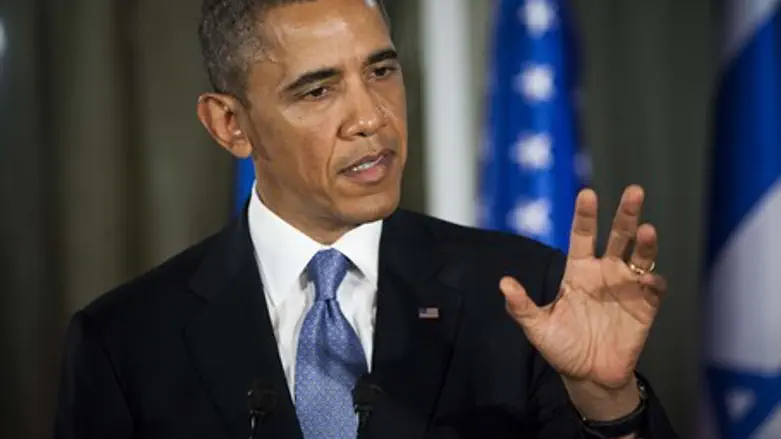
U.S. President Barack Obama said at the Saban Forum on Saturday that there must not be another Gaza in the Palestinian Authority-assigned areas of Judea and Samaria.
Israel pulled out of Gaza in 2005, as part of the “Disengagement”. This resulted in Hamas taking over the region and escalating rocket attacks at southern Israel.
Obama warned that in the event of a final agreement between Israel and the PA, there would be a "transition period" to ensure that Judea and Samaria does not become a security threat akin to Hamas-ruled Gaza. He said that the PA would have to accept such a transition period.
"This transition period requires some restraint on the part of the Palestinians as well. They don't get everything they want on day one," he said, according to the AFP news agency.
"The Israeli people can't expect a replica of Gaza in the West Bank," Obama added. "That is unacceptable."
The President also said that he was optimistic about the current round of talks between Israel and the PA, noting that his Middle East security envoy, General John Allen, had presented some security solutions to Israel.
Allen had concluded "that it is possible to create a two-state solution that preserves Israel's core security needs," said Obama.
"That's his conclusion, but ultimately he's not the decision-maker here, Prime Minister Netanyahu and the Israeli military and intelligence folks have to make that determination," he declared.
Speaking later at the same forum, U.S. Secretary of State John Kerry said Allen was working closely with Israeli forces to test scenarios and work out how to satisfy Israeli needs for years to come.
"He is helping us make sure that the border on the Jordan River will be as strong as any in the world, so that there will be no question about the security of the citizens, Israelis and Palestinians, living to the west of it," Kerry said.
"Never before has the United States conducted such an in-depth analysis of Israel's security requirements that arise from a two-state solution," he added.
Kerry said more than 160 U.S. experts were coordinating with the PA and the Jordanians as well as Israelis and running multiple scenarios, including future border issues and terrorism, to pinpoint Israel's needs.
He described the process as a "critical threading of the needle that needs to happen."
"What we put on the table is deadly serious, real," said Kerry.
Kerry was speaking to the Saban Forum after returning from his latest visit to Israel. On Friday, before he left for Washington, Kerry told reporters that Israel and the PA were “closer than they’ve been in years” to achieving a peace agreement.
Prime Minister Binyamin Netanyahu has reiterated that under any peace agreement, Israel "must be able to defend itself, by itself, with our own forces" an allusion to the reported debate over security in the Jordan Valley.
Israel has always insisted that in any final agreement it would have to maintain a military presence there, and has rejected outright the idea of any third party involvement. The PA rejects any long-term Israeli security presence in the Jordan Valley.
One report in the Maariv daily newspaper on Friday suggested that the Americans had agreed with Israel regarding its demand for IDF presence in the Jordan Valley even after a permanent agreement.
Meanwhile, Deputy Minister Ofir Akunis (Likud) has warned not to be too optimistic about the peace talks, stating that "If Kerry is optimistic, we must be very worried."
"We must ask: what progress? Is progress nothing but a separate word for 'withdrawal'? So let's focus on just one issue we dealt with this weekend: 'The security arrangements in the Jordan Valley'," he stated.
Akunis maintained that "security arrangements" is a euphemism for "uprooting communities and residents of the valley" and "the withdrawal of IDF forces and control." He pointed out that Israel has played this game before with international bodies - and the result has been more violence and bloodshed. "Even the Jordanians don't trust the Palestinian Authority."
Foreign Minister Avigdor Liberman has also poured cold water on Kerry’s optimism. Liberman, who spoke Friday night at the Saban Forum, said there was “zero trust” between the two sides.
Liberman stated that peace talks between are unlikely to bear fruit within the envisioned nine-month timeframe but that dialogue should continue.
The State Department, meanwhile, said that Kerry would meet Liberman on Sunday morning in Washington.
